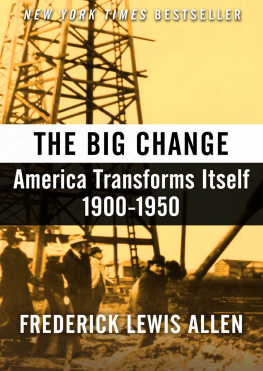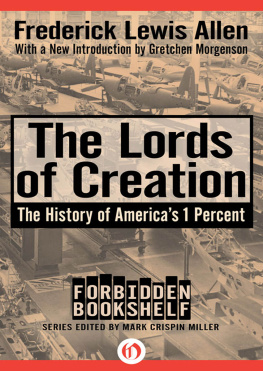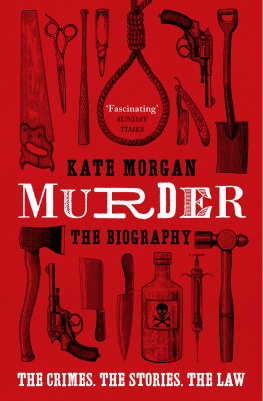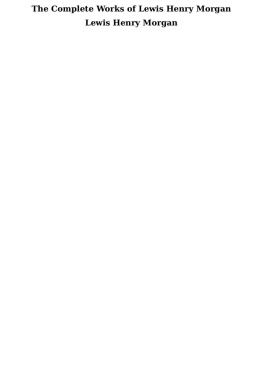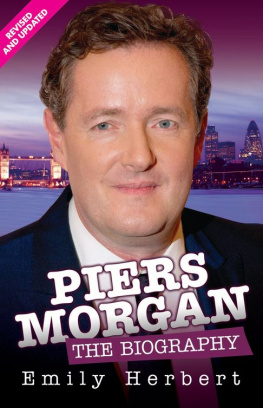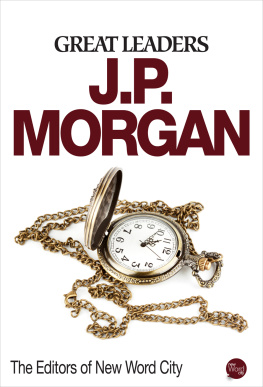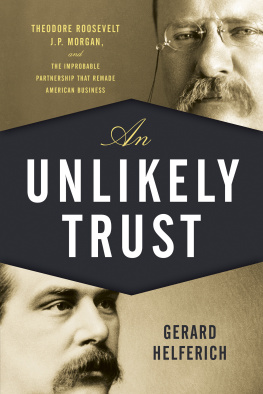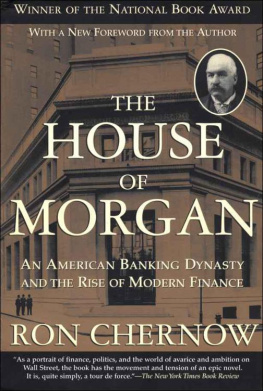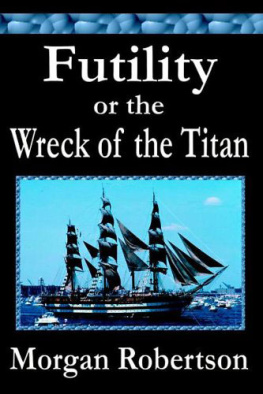The Great Pierpont Morgan
Frederick Lewis Allen

CONTENTS
PREFACE
I first encountered Pierpont Morgans personality some fourteen years ago, when I was working on an informal financial history called The Lords of Creation and read his testimony at the Pujo investigationthat testimony which is cited in the first chapter of this book, and again in the last few pages. Here, I thought, is an extraordinary man, strikingly different from the other financial and industrial princes of his day, and different, too, from the impression which he made upon the public mind. Ever since then I have played with the idea of writing about him at greater length. But not until 1947 could I find the time to begin it; and as soon as I went to work, the difficulty of the task became obvious.
This difficulty lay in the nature of the evidence about him. In the first place, it was curiously scanty. He himself had been very reticent, unwilling to be interviewed or written about. This reticence continued in his son, who both worshipped him and was reluctant to have anything written about him; and it spread like a contagion among his family and associates. Furthermore, most financial reporting tends to be impersonal and to give few dramatic glimpses of men in action; and the contemporary financial chroniclers had walked with special circumspection when they approached 23 Wall Street. There were legends and anecdotes galore, but many of them were of uncertain veracity. Finally, what evidence had accumulated about Pierpont Morgan was strikingly divided between the one-sidedly laudatory and the one-sidedly derogatory.
Pierpont Morgans son-in-law, Herbert L. Satterlee, had written a detailed biography of him, rich in evidence as to various personal matters; but it was grossly flattering, occasionally inaccurate on business matters, and quite lacking in any perspective upon his father-in-laws financial operations and their significance. Accounts of Morgan, written and oral, by others who had been close to him seemed to me likewise to present him in an unbelievably benign aspect; these accounts could not be brushed aside and were often revealing, but could hardly be taken at their face value. And on the other side were a number of books, such as Lewis Coreys The House of Morgan and Matthew Josephsons The Robber Barons, which while helpful on the facts of many transactions seemed to me wholly unreliable as to Morgans motives and total impact upon the American economy; for they had apparently been written on the assumption that if a great capitalist did something which could be ascribed to any one of five motives, the duty of the historian was to ascribe it to the worst of the five, brushing aside all evidence which suggested laudable intentions and eagerly underlining any evidence which suggested base ones. Between the conscientiously flattering and the conscientiously hostile accounts of Morgan there was room enough to drive a ten-ton truck. (There were other books of a more judicial nature, notably Carl Hoveys The Life Story of J. Pierpont Morgan and John K. Winklers lively Morgan the Magnificent, but they were confusing to work with, for it was sometimes hard to know when they were presenting verified facts and when they were embroidering gossip or legend.)
Believing as I do that it ought to be possible to write about a man of note, whether he be a master of capital or a labor leader or a politician, without being wholly swayed by prejudice for or against the type of institution which he represented, and believing especially that it is a disservice to history to depict the conflicts between men of opposing social and economic ideas as conflicts between saints and sinners, when common sense should tell us that human beings are not thus compartmented, I have tried to steer a true course between the Morgan-praisers and the Morgan-dispraisers. Pierpont Morgan was a man with whom I would have disagreed strongly on most political and economic issues if I had been his contemporary. To me he represented a trend in the direction of economic affairs which had to be altered for the good of the country. But I am also convinced that he was a man great in character and force, whose immense influence was in many respects salutary. What I have tried to do, therefore, has been to show what sort of man he really was; how his ideas developed out of his background and the traditions of the group to which he belonged, and out of his experience; how both his ideas and his actions conflicted with those of others whose background and experience differed from his; and how they influenced, and were affected by, the course of American history.
Owing to the nature of the evidence, this has not been easy. As to the facts in this book I have been scrupulously careful, rejecting unverifiable legend. As to the interpretation of Morgans impulses and ideas and view of affairs, that is my own. I have tried to ask myself, From all the evidence available, and from whatever intuition I may have acquired about human nature, and especially about the impulses and ideas of men whose background and circumstances and position have in one way or another been comparable to Morgans, why do I think he acted as he did? Obviously, some readers will feel that I have accepted too navely the testimony of his admirers; others, that I have followed too closely the reasoning of his detractors. All I can say is that the picture painted here represents the fairest judgment I know how to bring to bear upon an extraordinary man who has never yet been adequately depicted, in his true colors, against the background of the times upon which his influence was so prodigious.
F . L . A .
I
JUDGMENT DAY
A few days before Christmas in the year 1912, John Pierpont Morgan, the most influential banker in the world and the mightiest personal force in American business life, was called to testify before an investigating committee in Washington. This groupa subdivision of the House Committee on Banking and Currencywas popularly known as the Pujo Committee, because its chairman was Arsne Pujo of Louisiana; and its aim was to demonstrate, through evidence brought out in its protracted hearings, that there existed in America a money trustthat a small group of New York bankers, headed by Pierpont Morgan, held such a grip on the money and credit resources of the country, and so dominated the big industrial and railroad corporations through interlocking directorates, that in effect the whole American economy lay under their control. Day after day the Pujo Committee had spread its evidence on the record, and now the inquiry was coming to its climax. Pierpont Morgan himself, the head and front of American banking power, was going to take the stand.
He was an old man now, well along in his seventy-sixth year. His hair, which had been dark in his youth, and then steel gray, was white and thin. Even his big straggling mustache, which had remained black until old age approached, was graying. Now as always the first thing that caught the attention of anyone who saw him for the first time was his nose, for it was bulbous and flaming red as the result of a baffling skin disease that had fastened itself upon him progressively during his later years. Only when one had accustomed oneself to the sight of this hideous and dismaying feature did one note his extraordinary eyes, whose burning intensity had so often held men in awe of him. But those eyes were tired now. The vital force in him was waning; though no one in the committee room could know it, he was within four months of his death. This was to be his last public appearance, his last accounting for his stewardship.


